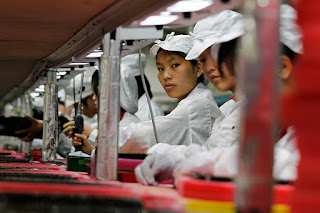Note 1: The author of this article, Richard Locke, is the Head of the MIT
(Massachusetts Institute of Technology) Political Science Department and the Deputy Dean of the MIT Sloan School
of Management. His current research is focused on improving labor and environmental conditions in global supply chains.
In this article, which appeared first in Boston Review (see note 2), before appearing in Salon.com, Locke asks the important question: "Can global brands create just supply chains?" His opening comment is: "To do so, the public will need to hold companies like Apple and Nike accountable for fair labour standards." The article is quite long, however it's well worth the read, providing a detailed and comprehensive overview of the global supply chain involved in the production of many of the goods we value, and why hoping that corporations "police" themselves is misplaced hope. He calls for significant engagement by civil society and governments.
Note 2: I hadn't heard of Boston Review before, so I looked it up. On its website, it describes itself this way: "Boston Review is a magazine of ideas, independent and nonprofit.
We cover lots of ground—politics, poetry, film, fiction, book reviews,
and criticism. But a few premises tie it all together: that democracy
depends on public discussion; that sometimes understanding means going
deep; that vast inequalities are unjust; that human imagination breaks
free from neat political categories; and that powerful images are worth
piles of words." I might add that the cover title of the most recent Boston Review is JUST WORK: A Corporate Responsibility?.
Posted here are the first few paragraphs of Locke's article, followed by a link to the whole article:
 |
Workers are seen inside a Foxconn factory in the township of
Longhua in Guangdong province. (Credit: Reuters/Bobby Yip) |
When Jia Jingchuan, a 27-year-old electronics worker in Suzhou,
China, sought compensation for the chemical poisoning he suffered at
work, he appealed neither to his employer nor to his government.
Instead, he addressed the global brand that purchased the product he was
working on. “We hope Apple will heed to its corporate social
responsibility.”
In the past, his appeal would probably have
fallen on deaf ears. But today, throughout the world, buyers in many
industries have acknowledged a degree of responsibility for workplace
conditions in supplier factories and pledged to ensure that the goods
they eventually market are not made under abusive, dangerous,
environmentally degrading, or otherwise unethical conditions. These
businesses have committed to using private, voluntary regulation to
address labor issues traditionally regulated by government or unions.
And for the most part, the companies have acted on these commitments.
But
have these private efforts improved labor standards? Not by much.
Despite many good faith efforts over the past fifteen years, private
regulation has had limited impact. Child labor, hazardous working
conditions, excessive hours, and poor wages continue to plague many
workplaces in the developing world, creating scandal and embarrassment
for the global companies that source from these factories and farms.
That
is my reluctant conclusion after a decade studying this issue. Before I
turned my attention to global labor standards, I was a student of labor
and politics in Western Europe and the United States. I came to the
idea of private regulation with the hope that it might be a new, suppler
way of ensuring workers fair compensation, healthy and safe conditions,
and rights of association.
To test that hope, I began studying
Nike because I was impressed with its commitment to labor standards.
After several years of effort, with many conversations and visits to
corporate headquarters, I convinced the company to share its factory
audit reports and facilitate visits to its suppliers. Eventually my case
study evolved into a full-fledged research project involving the
collection, coding, and analysis of thousands of factory audit reports;
more than 700 interviews with company managers, factory directors, NGO
representatives, and government labor inspectors; and field research in
120 factories in fourteen different countries. What began as a study of
one company (Nike) in a particular industry (athletic footwear) grew to
include several global corporations competing in different industries,
with different supply chain dynamics, operating across numerous national
boundaries.
But what started in hope ended in disappointment. ...
Access the whole article by clicking here.
- submitted by Gareth
 Nick will share stories from his 14 years at The Stop, a progressive
food organization that uses good food to build health, hope and
community, and that has inspired a movement of Community Food
Centres in cities — including Winnipeg — across the country.
Nick will share stories from his 14 years at The Stop, a progressive
food organization that uses good food to build health, hope and
community, and that has inspired a movement of Community Food
Centres in cities — including Winnipeg — across the country.+copy.jpg)









